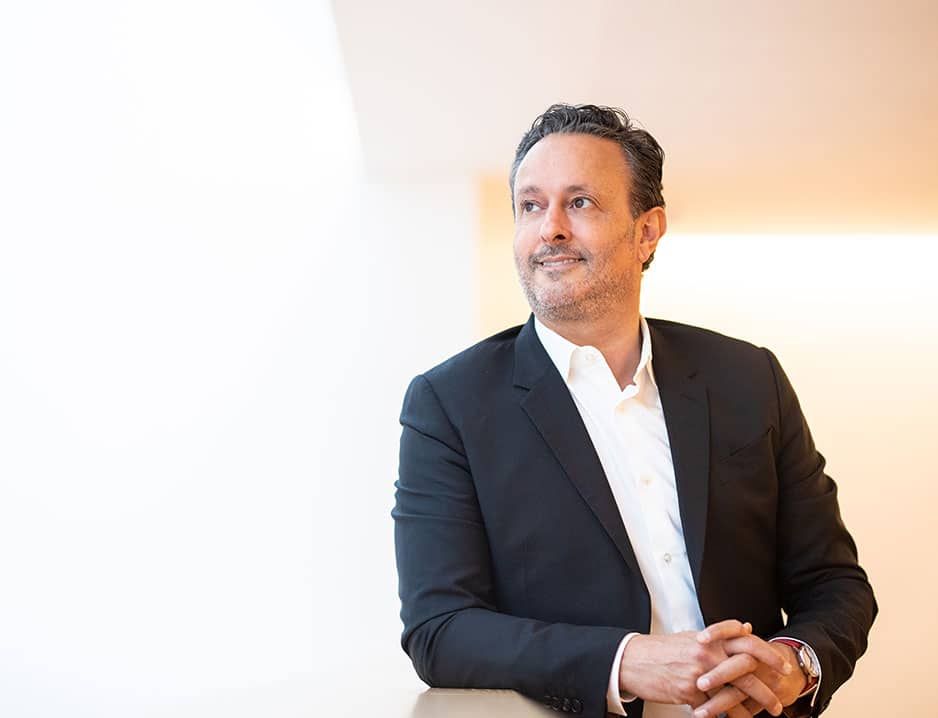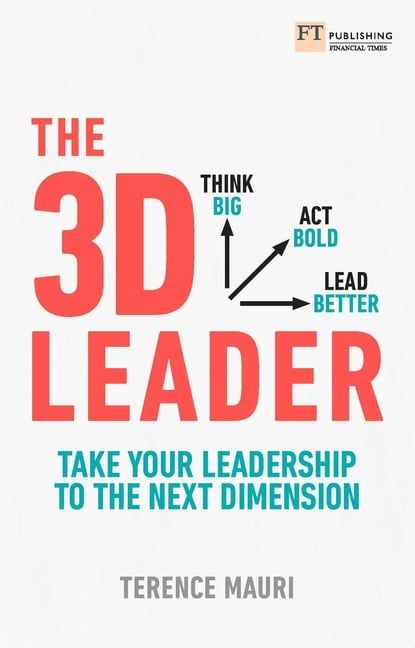
Leading disruption thinker and bestselling author Terence Mauri has one piece of advice for HR leaders and their organisations: embrace today’s AI tools and use them to re-imagine your business if you want to win the future.
Recently I received an email from an executive assistant called Amy Ingram. It was a friendly, professional email to schedule a meeting with the CEO of a new tech company I was researching for my new book The 3D Leader. After a couple of email exchanges, the Zoom meeting was confirmed and I thanked Amy for her help. When I got to speak with the CEO later that week, he looked at me with a smile and asked, in a rather curious tone, ‘What did you think of Amy Ingram’s emails?’ A little confused, I replied that they were very professional and courteous and, most importantly, achieved a great outcome. The CEO smiled again, paused and said that he had a confession to make: Amy was not a human being. She was, in fact, AI and the clue was in her initials (Amy Ingram). ‘Will you forgive me?’ he asked.
Next is Now
My first reaction was embarrassment as I realised I hadn’t been having a conversation with a human being. My second reaction was paranoia. I asked myself was I part of a Netflix Black Mirror film. My final reaction was that science fiction has become science fact. The future has already arrived: cars that can drive themselves, platforms that can anticipate our every needs and robots capable of everything from advanced manufacturing to complex surgery. Of course, I did forgive the CEO, because everywhere around me I am seeing that we live and work in a phy-gital world, a combination of physical and digital. As humans and machines increasingly work alongside each other, leaders will be forced to rethink the nature of work, how we work and why we work and they’ll be more pressure to adopt AI and automation because the cost and efficiency gains are so much higher: the more data you feed into algorithms, the better they will get over time. The challenge for leaders is to learn to see things in the present even if they are in the future.
AI is the new electricity
Reading just a few months of headlines shows that AI and automation are quickly and inevitably becoming the new engines of growth as organisations compete on the rate of learning and personalised, predictive and zero friction customer experiences. Starbucks will launch 4,000 AI enabled robo-baristas in stores by the end of 2020 in order to automate and optimise the brewing, frothing, and drinking of coffee. Not to be outdone, fast food giant McDonald’s is planning to test kiosks at some of its locations where customers can order by talking to a digital assistant while China’s Luckin Coffee grew to over 4,500 stores in three years by putting data and algorithms at the centre of the company. AI is the new electricity and data is the new oil.
Disruption drives reinvention
Ernest Hemingway wrote that change arrives in two ways – gradually and then suddenly. Change is happening here and now driven by powerful AI that is already available – and it will eat incumbents for lunch if leaders fail to harness the power of AI. Behind the scenes digital superpower companies such as Amazon, Google, and Microsoft have already re-engineered their business model and entire operating model around software, data, and AI to power a completely new breed of organisation. Mental retooling needs to happen throughout the organisation. Now it’s no longer just about return on investment. It’s about return on intelligence (ROI). Royal Dutch Shell, for example, recently announced it is expanding an online program to teach AI skills. So far 2,000 of its 82,000 employees have expressed interest or have been approached to participate. The online courses are offered by learning platform Udacity, which has rolled out an “AI leadership program” to help leaders reinvent how their organisations operate and compete.
Survive or thrive in the age of AI
Apart from new software tools, competing in the age of AI also means leaders must ask new questions to old problems and new questions to new problems. When we operate at the end of uncertainty, questions matter more than answers. What questions should HR leaders be asking to win in the age of AI?
I propose you start with first principles and ask ‘what questions do we want to be remembered for?’
Final Word
With so many unknowns, how can companies, individuals, and society as a whole win? For example, 1 in 3 employees believe their job will not exist in a few years due to AI and automation. Now is not the time to adopt a ‘wait and see’ strategy. As agents of change, HR leaders need a more expansive view about their organisation’s responsibilities and must work together to ensure people thrive now and in the future.
 Terence Mauri is founder of Hack Future Lab, bestselling author and a global authority challenging leaders to thrive in the age of disruption. His new book The 3D Leader: take your leadership to the next dimension is out now and has been described as ‘a powerful and instantly practical toolkit for maximising your leadership potential’ by Stuart Crainer, Thinkers50 co-founder.
Terence Mauri is founder of Hack Future Lab, bestselling author and a global authority challenging leaders to thrive in the age of disruption. His new book The 3D Leader: take your leadership to the next dimension is out now and has been described as ‘a powerful and instantly practical toolkit for maximising your leadership potential’ by Stuart Crainer, Thinkers50 co-founder.
Terence Mauri will be speaking at Executive Networks’ Back2Better webinar series in partnership with Thinkers50 on 16 September. Details here

Thinkers50 Limited
The Studio
Highfield Lane
Wargrave RG10 8PZ
United Kingdom

Thinkers50 Limited
The Studio
Highfield Lane
Wargrave RG10 8PZ
United Kingdom

Thinkers50 Limited
The Studio
Highfield Lane
Wargrave RG10 8PZ
United Kingdom
| Cookie | Duration | Description |
|---|---|---|
| LANG | 9 hours | Linkedin set this cookie to set user's preferred language. |
| nsid | session | This cookie is set by the provider PayPal to enable the PayPal payment service in the website. |
| sp_landing | 1 day | The sp_landing is set by Spotify to implement audio content from Spotify on the website and also registers information on user interaction related to the audio content. |
| sp_t | 1 year | The sp_t cookie is set by Spotify to implement audio content from Spotify on the website and also registers information on user interaction related to the audio content. |
| tsrce | 3 days | PayPal sets this cookie to enable the PayPal payment service in the website. |
| x-pp-s | session | PayPal sets this cookie to process payments on the site. |
| __cf_bm | 30 minutes | This cookie, set by Cloudflare, is used to support Cloudflare Bot Management. |
| Cookie | Duration | Description |
|---|---|---|
| l7_az | 30 minutes | This cookie is necessary for the PayPal login-function on the website. |
| Cookie | Duration | Description |
|---|---|---|
| CONSENT | 2 years | YouTube sets this cookie via embedded youtube-videos and registers anonymous statistical data. |
| _ga | 2 years | The _ga cookie, installed by Google Analytics, calculates visitor, session and campaign data and also keeps track of site usage for the site's analytics report. The cookie stores information anonymously and assigns a randomly generated number to recognize unique visitors. |
| _gat_gtag_UA_10408481_1 | 1 minute | Set by Google to distinguish users. |
| _ga_ZP8HQ8RZXS | 2 years | This cookie is installed by Google Analytics. |
| _gid | 1 day | Installed by Google Analytics, _gid cookie stores information on how visitors use a website, while also creating an analytics report of the website's performance. Some of the data that are collected include the number of visitors, their source, and the pages they visit anonymously. |
| Cookie | Duration | Description |
|---|---|---|
| NID | 6 months | NID cookie, set by Google, is used for advertising purposes; to limit the number of times the user sees an ad, to mute unwanted ads, and to measure the effectiveness of ads. |
| test_cookie | 15 minutes | The test_cookie is set by doubleclick.net and is used to determine if the user's browser supports cookies. |
| VISITOR_INFO1_LIVE | 5 months 27 days | A cookie set by YouTube to measure bandwidth that determines whether the user gets the new or old player interface. |
| YSC | session | YSC cookie is set by Youtube and is used to track the views of embedded videos on Youtube pages. |
| yt-remote-connected-devices | never | YouTube sets this cookie to store the video preferences of the user using embedded YouTube video. |
| yt-remote-device-id | never | YouTube sets this cookie to store the video preferences of the user using embedded YouTube video. |
| yt.innertube::nextId | never | This cookie, set by YouTube, registers a unique ID to store data on what videos from YouTube the user has seen. |
| yt.innertube::requests | never | This cookie, set by YouTube, registers a unique ID to store data on what videos from YouTube the user has seen. |
| Cookie | Duration | Description |
|---|---|---|
| DEVICE_INFO | 5 months 27 days | No description |
| loglevel | never | No description available. |
| m | 2 years | No description available. |
Thinkers50 Limited has updated its Privacy Policy on 28 March 2024 with several amendments and additions to the previous version, to fully incorporate to the text information required by current applicable date protection regulation. Processing of the personal data of Thinkers50’s customers, potential customers and other stakeholders has not been changed essentially, but the texts have been clarified and amended to give more detailed information of the processing activities.